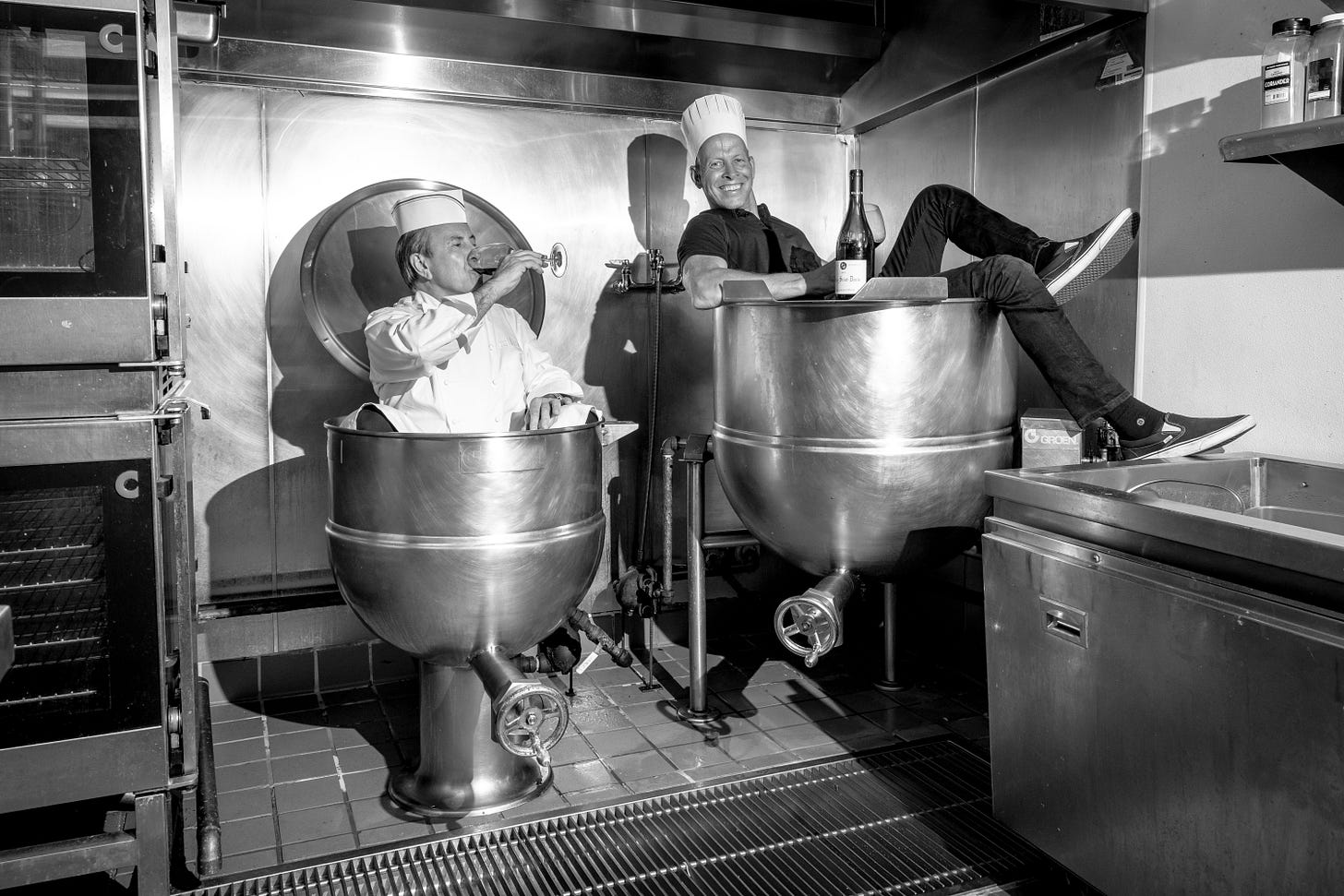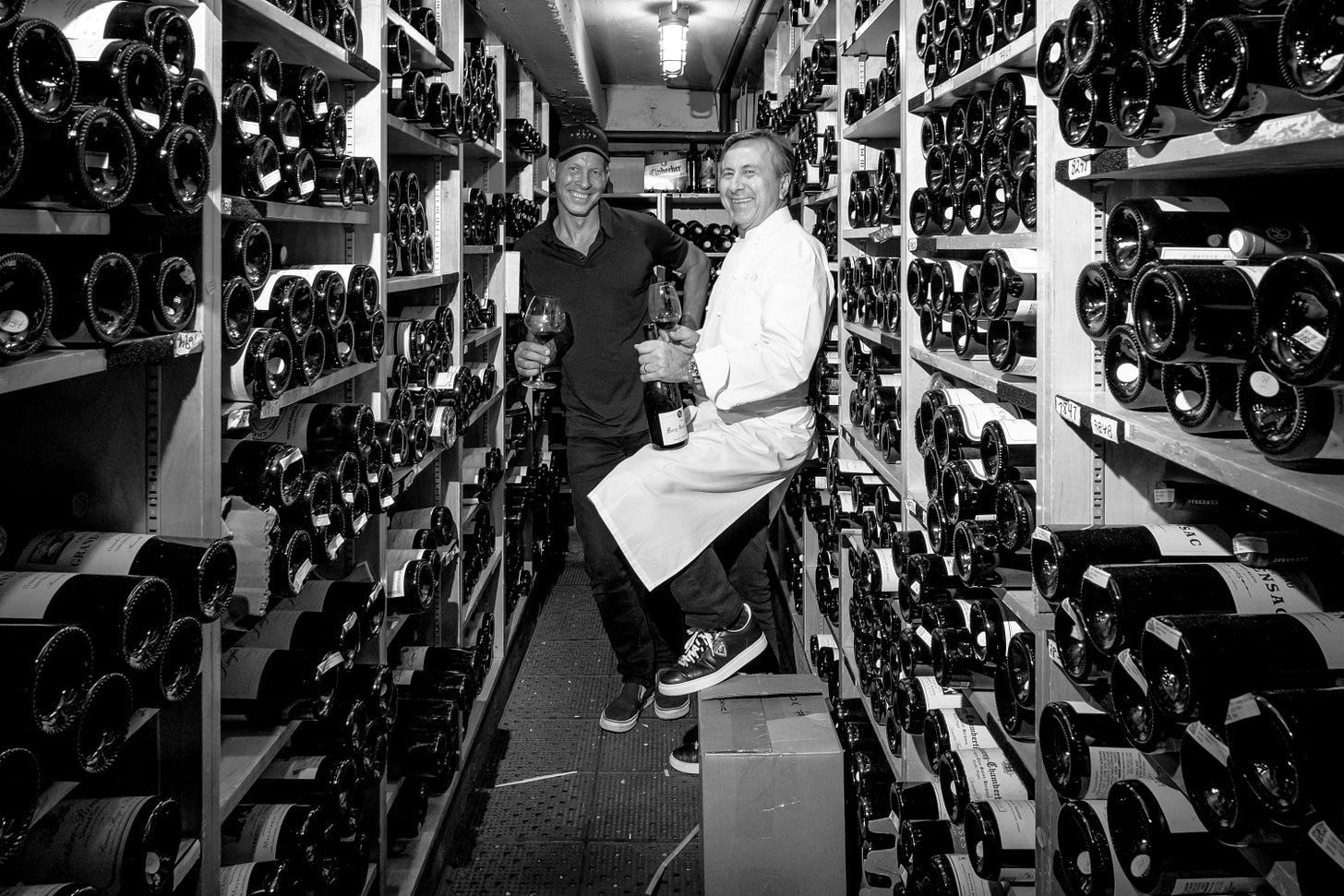Stirring Things Up With Chef Daniel Boulud
A chat with one of the World's most loved chefs, the man simply known as “DB"

As one of the world’s greatest modern-day chefs, Daniel Boulud runs dozens of restaurants globally, including establishments in Singapore, Dubai, at sea on Celebrity ships, and more than one dozen in New York City.
Throughout his career, Boulud has been named “Chef of the Year” by Bon Appétit magazine, and has earned several James Beard Awards including “Outstanding Chef” in 1994 and “Outstanding Restaurateur” in 2006. His eponymous New York City restaurant, Daniel, has a two-Michelin star rating, while two of his other NYC restaurants, Le Pavillon and Jōji, have each earned one Michelin star.
Boulud is also considered an outstanding culinary mentor and his restaurants have been a launch pad for many chefs who have gone on to open their own establishments around the country. He recently re-opened Cafe Boulud so I popped uptown to chat with the man, DB.
John McDonald: Given you’ve been both chef and owner for decades - in particular at the highest level of fine dining - what would you say has changed the most (in fine dining) over that period?
Daniel Boulud: I think what has changed the most in fine dining — and in all dining — is social media. Today, people control their marketing and message in a different way than in the past. Customers also have a voice in a different way than in the past, and businesses can project themselves differently. It’s been a huge impact on our industry. The digital world has put everyone in a crazy race.
JM: In my experience entrepreneurs - and you are certainly that, not just a chef or owner - who achieve this level of success have routines and habits that drive those results. What are some of those routines?
DB: I have the chance to live right above the store. I’ve been living above Daniel for over 25 years and in the same zip code for 40 years. And my other places are within reasonable reach.
I also travel to visit other restaurants around the globe, but that’s not part of my everyday routine. I feel it’s very important to live close to your headquarters. I also feel that constant communication is important with my staff. I also taste the food at my restaurants all day long. I don’t know if it’s a routine, but it’s a concern that allows me to see if there’s a weakness but also to be in the dining room to check on the service, as well — I am not “after” anyone, but I am “with” everyone.
My personal routine is to have breakfast in the morning with my kids and see them at night before they go to bed.
JM: If there was one thing you could tell me about cooking that would help me become a better home chef, what would that be?
DB: It all depends on the time you have at home. It’s not a question of budget for good home cooking. It’s a question of time, equipment, and efficiency. Cooking at home should be soulful, spontaneous, and delicious. It’s something that you’re confident you can do comfortably. To become a better chef first you should have a cookbook collection as inspiration: it could be a seasoning or a flavor composition. I use one pan for maybe three applications to get to the final dish. It’s a good exercise. I love to make one-pot meals that are delicious and thrilling for gathering around the table, like pot roast. You also want a very good pantry with oils, vinegars, and spices. You also want very good pots and pans. I wish I could be more of a home cook.

JM: With restaurants all over the globe, what is your travel routine? Any travel hacks or secrets?
DB: My travel routine is to try not to miss my flight. I’m a carry-on kind of guy. I take a garment bag, a small suitcase, and another bag. If I take an overnight flight, I always try to have a very nice meal the day I’m leaving between lunch and dinner so I can try to sleep right away and try to avoid eating on the plane. While traveling to the airport, I do a recap with the team. When you’re waiting for the plane it’s a good time to catch up. I like to rest on a plane but I’m not the kind of guy who needs two Scotches before he can relax. The secret is to plan well and try to get through immigration as fast as possible.
JM: Do you think it would be beneficial if restaurant owners were able to rate their customers in the same way Uber and other customer services do now?
DB: Yes and no. Of course, you don’t want to do anything that might offend any customer or make them frustrated or concerned with the type of hospitality you provide. At the same time, a bad customer should be banned across the board. For the most part, we have little problems with customers. We don’t care to rate them as long as they want to come back. But we do rate them when they are good customers and they are very nice people and they are nice to the staff and they genuinely love the experience. We like to rate them to bring them back, for sure. People who have created no connection with our team, we don’t want to rate them. We just hope they will come back, but we have no attachment.
JM: And if tomorrow someone bought all your restaurants but said you can keep one but that would be the only one you can own for the future, what would that be?
DB: We just reopened Cafe Boulud. If someone wants to buy all my restaurants, they all have my name attached to them for the most part. I own the real estate and I live above Daniel, so I would keep Daniel and Cafe Boulud and someone else can have the rest.
JM: Do you wish people would dine without their phones? Any thoughts on the impact of how everyone is rarely truly engaged in their meal or their dining guests?
DB: When you dine with a phone you’re either very bored or you’re by yourself and you do your work. It’s one thing if someone wants to catch up at the end of the meal. We try to entertain people enough that they don’t need their phones. Guests who are truly well-paired never use their phones…so choose your friends wisely. We see more and more parents giving phones to kids. In a way it’s good, but the kids don’t have parent time with the meal. I have young kids, but there’s never ever a phone at the table. But if we travel and we want to have a conversation, my wife gives them something to do. But paper and crayons do that, too.
JM: Are there any restaurants from the past that you miss?
DB: 21 Club in New York, not for the culinary but for the history, the most powerful dining room with the most powerful clients. All the CEOs had their own toys hanging from the ceiling Also, Chanterelle was the quintessential French restaurant run by an American chef. It was humble, and delicious, and was one of the first downtown establishments. I also miss the Four Seasons’ original Pool and Grill Room.
JM: What is in store in 2024 for you and your team?
DB: We have some exciting new projects including Café Boulud Beverly Hills, a new steakhouse in New York City, and a few more surprises as well.


I miss Chanterelle, too.
Nice interview! Just celebrated our Wedding Anniversary at Daniel last month. Still wonderful. The food, service and hospitality are exceptional. Also had a nice lunch at Bar Boulud.